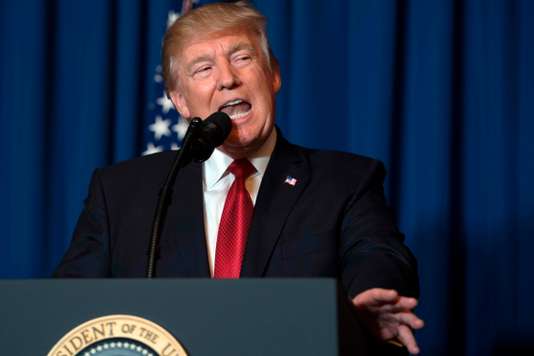Will Trump’s tariffs on China usher an international trade war?
An international trade war repeats itself again

President Donald Trump plans to place terrifying tariffs.
Potentially sparking an international trade war last seen in the 1930s, history may repeat itself with Pres. Donald Trump enacting two tariffs that will negatively affect the international economy. With Trump’s America-first agenda, he imposed two different tariffs, indirectly and directly targeting China for the U.S. trade deficit.
Trump claims to start engaging diplomatic relations with China in order to reduce the trade imbalance. However, on March 23, China retaliated Trump’s tariffs with their own, claiming to place tariffs on over 120 U.S. imported goods after repudiating WTO (World Trade Organization) rules.
In March, Pres. Trump announced plans to place two demanding tariffs that may drastically exacerbate the international economy dependent on U.S. imports. On March 1, Trump announced plans to impose tariffs on imports of steel and aluminum with the intentions to protect this failing American industry, known as protectionism. Claiming over the years other countries have been taking advantage of the U.S., charging massive tariffs on U.S. imports while other countries pay a bare minimum, Trump justifies his claim with a secret investigation under Section 232 of the 1962 trade law. His administration concluded that $46 billion dollars were lost from tariff imports.
It may seem understandable for Trump to enact tariffs based on an imbalanced international economy that would theoretically improve the American economy, but Trump forgets how impactful American trade is to the international economy. Many countries and companies depend on these vital materials for their products, but, with these tariffs, inflationary prices will rise. This can result in the end of American companies depends on, as well, and potentially raising consumer prices after China tariffs on U.S. imports. This “America-first” agenda will hurt the American and international economies
Although there is some hope for tariff actions not to be implemented, Trump seems to firmly stand on judgment to protect American aluminum and steel industries that have been declining for years. Many countries, however, view his actions as somewhat irrational, worsening other countries’ economies. Countries are trying to figure out a solution to these tariffs. One solution is to negotiate using the World Trade Organization, justifying claims that violate international trade law.
However, there seems to be no negotiations on either sides. As a result, massive repercussions have followed after his tariff announcement having countries dependent on these materials— Canada, the European Union, South Korea, Mexico, and China — retaliating, imposing their own tariffs on U.S. imports. On March 2, the EU pledged to counter with tariffs on US-made bourbon, motorcycles and jeans and by March 16 the EU extended the list of American products to over 100 items.
Although on March 8 Trump exempted Canada and Mexico from the aluminum and steel tariffs, and by March 22 he granted exemptions for the EU, South Korea, Australia, Brazil, and Argentina, it becomes clear that Trump primarily targets the second largest economy, China with these tariffs. Further outraging the Chinese government, on March 22, Trump planned to hit the Chinese economy with an outlined plan to order $60 billion of Chinese goods. Responding that these tariffs that will hurt the Chinese economy, on March 23, China challenged the U.S. tariffs with their own, placing tariffs on over 120 U.S. goods that ranged from pork to steel.
Though these two largest economies, U.S. and China, are clashing with one another for economic global dominance, these tariffs will negatively impact international trade. If Trump taxes aluminum and steel, other countries will begin placing tariffs or stop importing U.S. goods. Canada could stop importing California wine and the EU could tax bourbon and motorcycles, products that are considered a “necessary” for East Coast states. These atrocious tariffs will lead to a trade war previously not seen since the Great Depression, hurting every economy.
Around the 1930s and during the Great Depression, Congress enacted the Smoot-Hawley Tariff Act, with the main goal of protecting U.S. agriculture and taxing 20,000 imported goods, which is seemingly similar to Trump’s tariffs on steel and aluminum to protect American industries. IN response, other countries retaliated and increased their tariffs. For example, American egg exports in 1929 plummeted from 919,543 to 13,662 by 1932. As a result, after the Smoot-Hawley Tariff Act was passed, U.S. imports drastically dropped, decreasing by 40 percent, and international banks began to fail as international trade declined. Between 1929 to 1934, world trading declined almost 66 percent.
Trump’s potential tariffs laws are expected to assist U.S. steel and aluminum companies after many complaints about unfair overseas competition. However, knowing about the historical tariff laws that ushered an international trade war with no true winner, would Trump still consider taxing imported goods and materials to provoke other countries and ultimately raising American consumer prices after domestic manufacturing companies depend on vital materials? Only time will tell.

Hobbies: Watching Alexa make coffee without me
Favorite shows: RuPaul's Drag Race
Places you want to travel to: Lost in Narnia with Victoria and...













